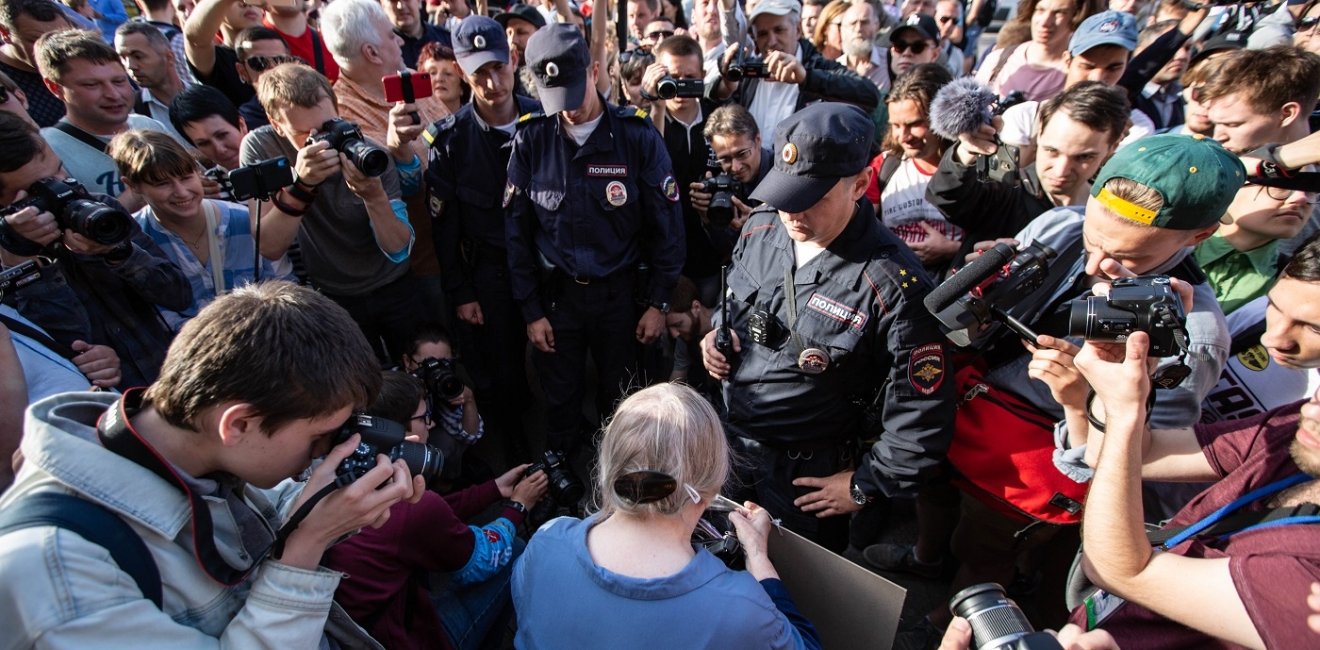
A blog of the Kennan Institute
BY JILL DOUGHERTY AND ROMAN DOBROKHOTOV
Since Russia launched its war against Ukraine in February, hundreds of journalists have fled Russia. Many felt threatened enough to gather their family, pack their bags, and take off—by plane, by car, sometimes on foot—not knowing whether they would ever be able to return home. Jill Dougherty recently traveled to the Baltics to interview some of these new exiles for the Kennan Institute’s KennanX podcast. Below is an excerpt from her interview with Roman Dobrokhotov, founder and editor in chief of The Insider. To hear the full episode, visit the episode page or your favorite podcast platform. The conversation has been edited for clarity and style.
Roman Dobrokhotov: The war against journalism in Russia started before the current war in Ukraine. It began in the spring of 2021. The war against journalism that Putin started then—arresting journalists, searching their homes, labeling them foreign agents—was preparation for the war in Ukraine.
We didn’t understand it at the time. But if you look at it now, what Putin did makes sense. In early 2021, he ordered troops to the Ukrainian border and then suddenly pulled them back. Why? Why didn’t he start the war last spring? For me, the logical explanation is the political turmoil inside Russia. Also, when Alexey Navalny returned to Russia and was arrested in January of 2021, there were massive protests. There were also big journalistic investigations, including ours. Together with Bellingcat, we had published investigations into Navalny’s poisoning and identified all the FSB agents involved in it. There were other investigations by our colleagues as well, such as the one about Putin’s daughters (legitimate and illegitimate). There was also Navalny’s own investigation into Putin’s palace in Sochi.
Putin understood that he didn’t have enough resources both to control the situation inside the country and wage a war on Ukraine, so he pulled the troops back. Within a few months we saw massive repressions against all the alternative voices inside the country, including activists and journalists. Hundreds of criminal cases were brought against activists. Most of them had to leave Russia. Those who didn’t leave are now in prison.
Was There Independent Journalism in Russia?
When I still lived in Russia and traveled abroad, people were really surprised that one could live in Russia and practice independent investigative journalism. They were sure that Russia was like North Korea. But as recently as a year ago, Russia had lots of journalists, including investigative journalists, who were brave enough to publish whatever they wanted.
In fact, it was possibly the best time and place to be a Russian investigative journalist. For one thing, we have a very high demand for investigative journalism because the government is completely closed, and we don’t have a lot of information about what it is doing. Our government is committing such awful crimes: poisoning journalists, waging wars, stealing. A lot of vivid stories could be written about it.
Another factor is the ocean of information that is available both in open sources and in databases. Today, everyone has social networks. Everyone uses cell phones. Everyone buys plane or train tickets on the internet. Everyone leaves a digital trace. Even Putin leaves a digital trace because he flies special government planes, and you can trace those planes and see where he is going.
In the past, an investigative journalist, was someone with a lot of sources and contacts. Their job was traveling, talking to people. And big media corporations thought that investigative journalism was declining: “It’s so expensive, we have to cut our budgets, we can’t afford a person who writes one article per month or even every two months. People click on other stories, they will click on gifs with kittens, but not on an investigative story about corruption.”
But now we have a totally new journalism. Now, investigative journalists are young people with laptops who don’t have a lot of sources or who have no sources at all, but who can use open sources of intelligence, who understand how databases work, who can navigate the black market of data—that is especially relevant for Russia. Everything you do is in some police database, and you can penetrate this database and for ten bucks buy all the data about everyone, including FSB agents.
Talking to Russians about the War in Ukraine
The war in Ukraine is the most important topic for us. Our audience is three times bigger than what it used to be before the war. Actually, our audience grew ten times, but the government blocked our website after the war started. People have to use VPNs (virtual private networks) to read us. So the demand for information in Russia is very, very high. People want to know about the war and about the future of the Russian economy after sanctions, and just to understand what is going on.
Many members of our audience were people who were living normal lives and didn’t want to know about politics. Now they understand that it is impossible anymore. Now they need to understand what this is all about. We’re trying to explain it to them in simple words. We have opinion columns. We have video explainers on YouTube. We also debunk fake news.
Does the average Russian have an appetite for information about the war? There are different answers to this question. You know the saying that appetite comes while eating. You need to have a little bit of a taste, a bite, in order to understand that you need it or want it. So when people bump into information about the genocide in Bucha, for example, they understand that they need to learn more about it.
What Does the Average Russian Think about the War?
I don’t know what is meant by “average” Russians. If we mean people who live in the regions, who are not highly educated but want to know something about what’s going on, then among these “average” people the demand for information is very high.
But we also have some 20–30 percent of the people who are very loyal to the government. Most of them are older people living in the regions. They identify with Putin. For them, Putin’s every failure is also their failure. So it’s very difficult for them to admit that, for twenty years, they were deceived and brainwashed and that all their expectations were wrong. We don’t try to persuade these people. We are working for the other 70 percent-plus of Russians, which is more than enough.
Exiled Russian Journalists Remain Connected to Russia
Russian journalists leave Russia without leaving it mentally. On Facebook, on Twitter—we are still talking about what’s happening in Russia. We know the weather there, the prices, what is closed, what is open. It may change at some point, in some years, but for now.… Look at the Russians coming to Riga, or Vilnius, or Tbilisi. These are beautiful countries, but no one is switching to Georgian politics in Georgia or to Latvian politics in Latvia. In Russia, everything is changing, and all our thoughts now are about Russia and Ukraine.
The opinions expressed in this article are those solely of the authors and do not reflect the views of the Kennan Institute.
Authors



Kennan Institute
After more than 50 years as a vital part of the Wilson Center legacy, the Kennan Institute has become an independent think tank. You can find the current website for the Kennan Institute at kennaninstitute.org. Please look for future announcements about partnership activities between the Wilson Center and the Kennan Institute at Wilson Center Press Room. The Wilson Center is proud of its historic connection to the Kennan Institute and looks forward to supporting its activities as an independent center of knowledge. The Kennan Institute is committed to improving American understanding of Russia, Ukraine, Central Asia, the South Caucasus, and the surrounding region through research and exchange. Read more

Explore More in The Russia File
Browse The Russia File
Chechnya as a Model of Modern Russia

Russia’s Indigenous Communities and the War in Ukraine

Gas and Power in a Changing US–Russia Relationship

